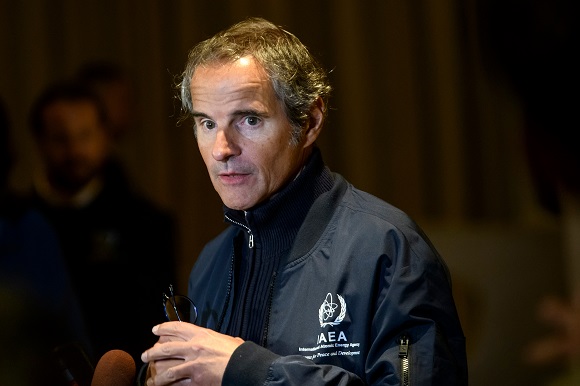By Anne Pollman and Cindy Riechau
dpa
Iran IAEA
Tehran, Iran (dpa) — The Iranian parliament has voted to temporarily suspend cooperation with the International Atomic Energy Agency (IAEA), state broadcaster IRIB reported on Wednesday.
The move came amid conflicting reports over how badly the country’s nuclear program was damaged by the targeted U.S. strikes at the weekend.
IAEA head Rafael Grossi had earlier called for nuclear inspections in Iran to resume following the ceasefire between the Islamic Republic and Israel.
Iran would not allow any IAEA inspectors into the country until the “safety” of the nuclear facilities is guaranteed, said Parliamentary Speaker Mohammad Bagher Ghalibaf.
The decision by the Iranian parliament not to work further with the IAEA still needs to be approved by Iran’s Guardian Council and the Security Council. The Security Council, led by Supreme Leader Ayatollah Khamenei, is the most important political decision-making body in the country.
‘Inconclusive’ intelligence
The past 24 hours have seen a swirl of differing information about the actual impact of the ambitious U.S. strikes on the three nuclear facilities at Isfahan, Natanz and Fordo, and the effect overall on Iran’s nuclear program.
In the immediate aftermath of the strikes, U.S. President Donald Trump said the sites had been “completely and totally obliterated.”
However, an initial intelligence evaluation suggested that the bombardment failed to destroy Iran’s underground nuclear facilities, The New York Times, the Washington Post and CNN reported on Tuesday, citing officials familiar with the military intelligence report from the Pentagon’s Defense Intelligence Agency (DIA).
Trump soon afterwards blasted the media reports as “fake news.” He went further at a NATO summit in The Hague on Wednesday, telling reporters that broadcasters CNN and MSNBC, and the New York Times were “scum” for their reporting on the incident.
Iran’s nuclear program is “gone for years … inside it’s all collapsed,” he said at the press event alongside NATO Secretary General Mark Rutte, as well as U.S. Secretary of State Mark Rubio and Defense Secretary Pete Hegseth.
The U.S. attacks had brought about the end of the war, he said.
The Israeli army said on Wednesday that it believed the attacks had set back the Iranian nuclear program by years, but it was too early for the military to confirm this. The current military assessment is that it was badly damaged, said military spokesman Effie Defrin.
Trump also addressed Iranian claims that they had moved the enriched uranium out of the facility: “We believe all of this stuff is down there. We don’t think they had nearly the time, because to get that out is a very difficult thing.”
The intelligence, however, was “very inconclusive,” he admitted.
U.S.-Iran talks ongoing
When it came to current relations with Iran, the U.S. is “actually getting along with them very well right now,” Trump said.
U.S. Special Envoy Steve Witkoff confirmed late Tuesday that the U.S. has begun talks with Iran on a permanent peace agreement.
Speaking on Fox News, Witkoff said that the talks are “promising.”
“We’re already talking to each other, not just directly, but also through interlocutors,” he said.
©2025 dpa GmbH. Distributed by Tribune Content Agency, LLC.


